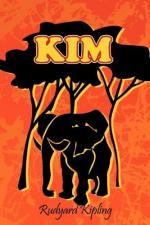Then her mood changed, and she bade one of the escort ask whether the lama would walk alongside and discuss matters of religion. So Kim dropped back into the dust and returned to his sugar-cane. For an hour or more the lama’s tam-o’shanter showed like a moon through the haze; and, from all he heard, Kim gathered that the old woman wept. One of the Ooryas half apologized for his rudeness overnight, saying that he had never known his mistress of so bland a temper, and he ascribed it to the presence of the strange priest. Personally, he believed in Brahmins, though, like all natives, he was acutely aware of their cunning and their greed. Still, when Brahmins but irritated with begging demands the mother of his master’s wife, and when she sent them away so angry that they cursed the whole retinue (which was the real reason of the second off-side bullock going lame, and of the pole breaking the night before), he was prepared to accept any priest of any other denomination in or out of India. To this Kim assented with wise nods, and bade the Oorya observe that the lama took no money, and that the cost of his and Kim’s food would be repaid a hundred times in the good luck that would attend the caravan henceforward. He also told stories of Lahore city, and sang a song or two which made the escort laugh. As a town-mouse well acquainted with the latest songs by the most fashionable composers — they are women for the most part — Kim had a distinct advantage over men from a little fruit-village behind Saharunpore, but he let that advantage be inferred.
At noon they turned aside to eat, and the meal was good, plentiful, and well-served on plates of clean leaves, in decency, out of drift of the dust. They gave the scraps to certain beggars, that all requirements might be fulfilled, and sat down to a long, luxurious smoke. The old lady had retreated behind her curtains, but mixed most freely in the talk, her servants arguing with and contradicting her as servants do throughout the East. She compared the cool and the pines of the Kangra and Kulu hills with the dust and the mangoes of the South; she told a tale of some old local Gods at the edge of her husband’s territory; she roundly abused the tobacco which she was then smoking, reviled all Brahmins, and speculated without reserve on the coming of many grandsons.
Chapter 5
Here come I to my own again
Fed, forgiven, and known again
Claimed by bone of my bone again,
And sib to flesh of my flesh!
The fatted calf is dressed for me,
But the husks have greater zest for me ...
I think my pigs will be best for me,
So I’m off to the styes afresh.
The Prodigal Son.
Once more the lazy, string-tied, shuffling procession got under way, and she slept till they reached the next halting-stage. It was a very short march, and time lacked an hour to sundown, so Kim cast about for means of amusement.




